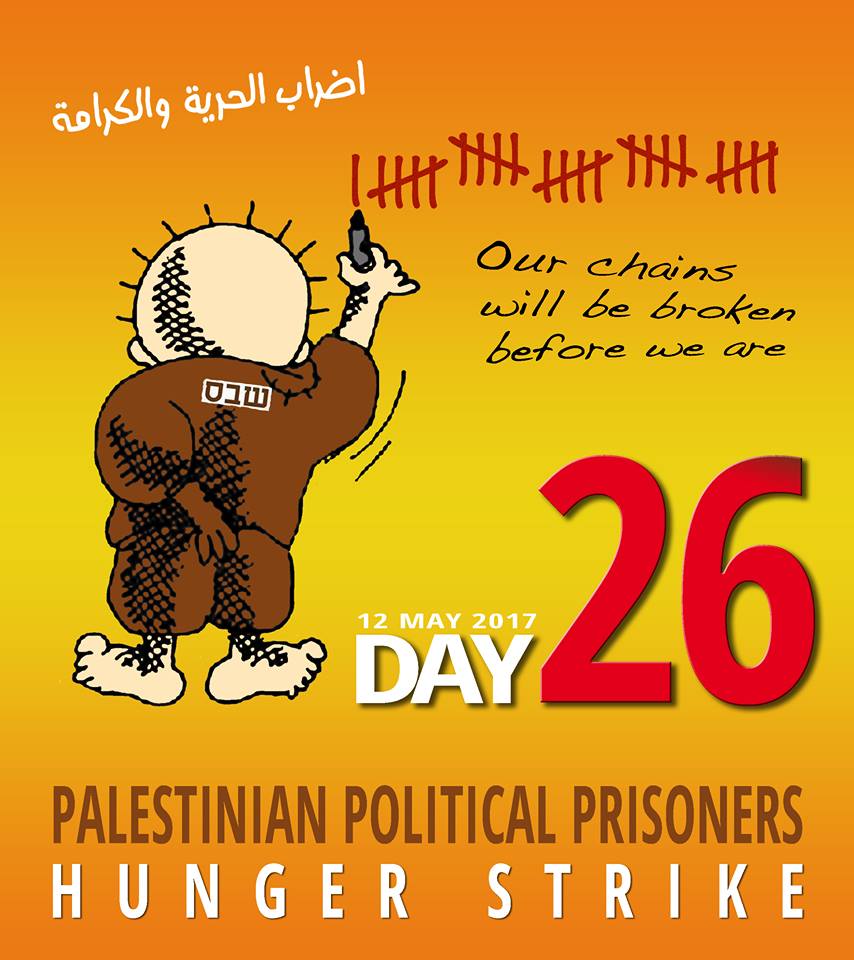
Photo: The Palestine Project
Palestinian prisoners are entering their 26th day of hunger strike in Israeli jails on Friday, 12 May. 1500 Palestinian prisoners launched the hunger strike, called the Strike for Freedom and Dignity, on 17 April, Palestinian Prisoners’ Day. The strikers have a number of demands that focus on basic human rights, like an end to the denial of family visits, appropriate medical treatment and health care, the right to distance higher education and an end to solitary confinement and administrative detention, imprisonment without charge or trial.
Originally on Thursday, Fateh officials had declared that they were calling on all Fateh members in prisons, aside from sick prisoners and children, to join the hunger strike. However, later on Thursday evening, Fateh officials retracted the call after a reported three-hour-long meeting of the Fateh Central Committee. Fateh Central Committee member Marwan Barghouthi is one of the leaders of the strike. Barghouthi received a visit from the International Committee of the Red Cross on Thursday; all legal, family and ICRC visits to Barghouthi had been blocked since 17 April. However, no information was released from the visit except for him sending his greetings to his wife and family.
Ma’an News reported that negotiations between the strikers and the Israel Prison Service may be beginning shortly; previously, the prison administration has refused to conduct negotiations with the leadership of the strike.
The hunger strike includes Palestinian prisoners from all factions, including prominent leaders such as Ahmad Sa’adat, the imprisoned General Secretary of the Popular Front for the Liberation of Palestine, fellow PFLP leader Ahed Abu Ghoulmeh, Hamas leaders Abbas Sayyed, Ibrahim Hamed and Hasan Salameh, Islamic Jihad leader Zaid Bseiso, and longest-serving Palestinian prisoners Nael Barghouthi and Karim Younes. Many of these leaders have been repeatedly denied legal visits.
Prisoners are reportedly suffering from severe dehydration, low blood pressure and inability to move in a number of places. In the Eshel prison, hunger strikers were isolated in the sections of criminal prisoners and subject to numerous raids by repressive forces. In addition, 47 sick prisoners on hunger strike were reportedly transferred from Nitzan Ramle prison to a so-called “field hospital.” Palestinian prisoners are also facing the threat of forced feeding from Israeli officials, including far-right internal security minister Gilad Erdan.
In Nitzan Ramle prison, around 70 hunger strikers are facing serious health conditions and are subject to punitive treatment including isolation, denial of access to recreation, frequent repressive raids, confiscation of salt and blocking of the windows to prevent sunlight from entering their cells. In Nafha prison, the media committee for the strike reported that multiple repressive units had invaded the cells of the strikers and beaten striking prisoners and sprayed tear gas after striking prisoners did not stand during inspection. Samer Abu Diak, one hunger striker held in the prison, told a lawyer at his legal visit that prisoners are repeatedly transferred inside the prison as a means of inducing stress and pressure on strikers, saying that “prisoners do not stay in a room for more than three days.”
Meanwhile, the Handala Center for Prisoners reported that 32 of the striking prisoners in section 3 of Ashkelon prison have declared a boycott of medical examinations in protest of the repeated raids and attacks by repressive forces, including forcing the striking prisoners to stand, handcuffed, in the middle of the prison yard from 8 am to 4 pm.
As the struggle inside the prisons deepened, Palestinians continued to protest to support the strikers and international efforts in solidarity with the strike continued to grow. In South Africa, a series of prominent government ministers and officials have joined a 24-hour hunger strike in solidarity with the Palestinian prisoners. In Paris, participants in a solidarity hunger strike organized a demonstration, posted materials about the Palestinian prisoners, and participated in a vigil outside Pizza Hut, and were visited by Jean-Louis Chalanset, the lawyer of Georges Ibrahim Abdallah, among others.
In Brussels, students at the Universite Libre de Bruxelles and the Universite Catholique du Louvain – Alma participated in a 24 hour hunger strike with tents and displays informing the student population about the struggle of the Palestinian prisoners. Striking students in Puerto Rico protesting austerity plans that threaten education also displayed their solidarity with the strike. Also in Chicago, the US Palestinian Community Network and other organizations held a large open solidarity tent with the prisoners and a one-day hunger strike.

Protests are being organized on Friday, 12 May in New York City, where Samidoun will again protest to support the hunger strikers; London, Madrid, Lyon, Paris, cities throughout Chile, Sacramento, Santa Clara, Brussels, Dungannon, Edinburgh, Kildare, Porto and more are also hosting demonstrations to support the prisoners.
Samidoun urges the organizing of events and actions to support the prisoners, rallying at Israeli embassies, federal buildings and public squares. These actions around the world will help to underline the global support for Palestinian political prisoners in their struggle for freedom, and the struggle of the Palestinian people for liberation. You can download flyers and posters for your events to support the prisoners among our resources.




